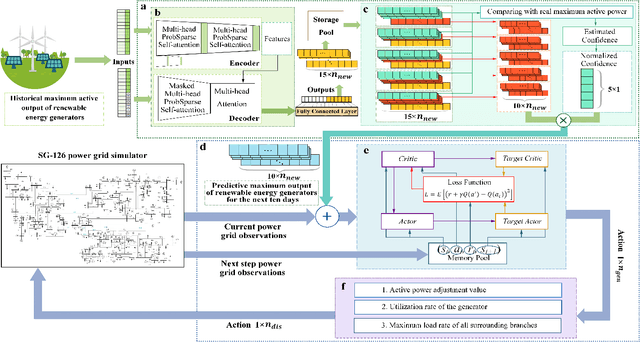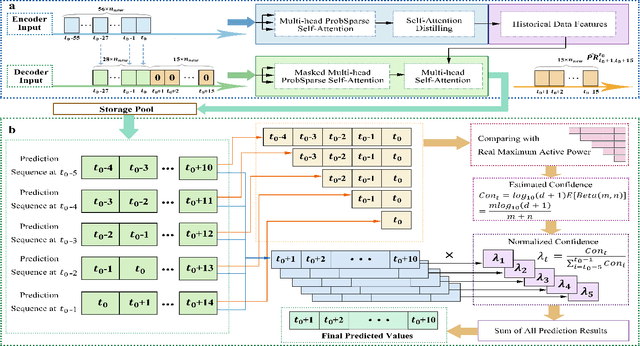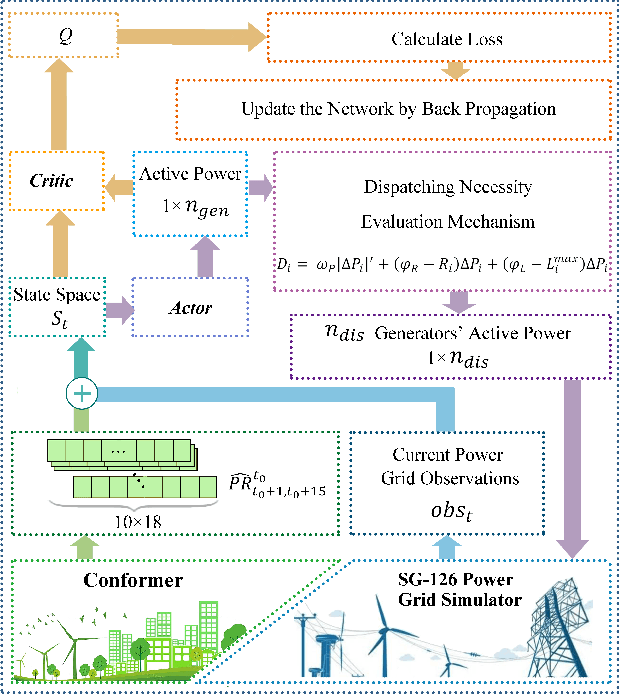Xuri Song
Real-time scheduling of renewable power systems through planning-based reinforcement learning
Mar 13, 2023



Abstract:The growing renewable energy sources have posed significant challenges to traditional power scheduling. It is difficult for operators to obtain accurate day-ahead forecasts of renewable generation, thereby requiring the future scheduling system to make real-time scheduling decisions aligning with ultra-short-term forecasts. Restricted by the computation speed, traditional optimization-based methods can not solve this problem. Recent developments in reinforcement learning (RL) have demonstrated the potential to solve this challenge. However, the existing RL methods are inadequate in terms of constraint complexity, algorithm performance, and environment fidelity. We are the first to propose a systematic solution based on the state-of-the-art reinforcement learning algorithm and the real power grid environment. The proposed approach enables planning and finer time resolution adjustments of power generators, including unit commitment and economic dispatch, thus increasing the grid's ability to admit more renewable energy. The well-trained scheduling agent significantly reduces renewable curtailment and load shedding, which are issues arising from traditional scheduling's reliance on inaccurate day-ahead forecasts. High-frequency control decisions exploit the existing units' flexibility, reducing the power grid's dependence on hardware transformations and saving investment and operating costs, as demonstrated in experimental results. This research exhibits the potential of reinforcement learning in promoting low-carbon and intelligent power systems and represents a solid step toward sustainable electricity generation.
Confidence Estimation Transformer for Long-term Renewable Energy Forecasting in Reinforcement Learning-based Power Grid Dispatching
Apr 10, 2022



Abstract:The expansion of renewable energy could help realizing the goals of peaking carbon dioxide emissions and carbon neutralization. Some existing grid dispatching methods integrating short-term renewable energy prediction and reinforcement learning (RL) have been proved to alleviate the adverse impact of energy fluctuations risk. However, these methods omit the long-term output prediction, which leads to stability and security problems on the optimal power flow. This paper proposes a confidence estimation Transformer for long-term renewable energy forecasting in reinforcement learning-based power grid dispatching (Conformer-RLpatching). Conformer-RLpatching predicts long-term active output of each renewable energy generator with an enhanced Transformer to boost the performance of hybrid energy grid dispatching. Furthermore, a confidence estimation method is proposed to reduce the prediction error of renewable energy. Meanwhile, a dispatching necessity evaluation mechanism is put forward to decide whether the active output of a generator needs to be adjusted. Experiments carried out on the SG-126 power grid simulator show that Conformer-RLpatching achieves great improvement over the second best algorithm DDPG in security score by 25.8% and achieves a better total reward compared with the golden medal team in the power grid dispatching competition sponsored by State Grid Corporation of China under the same simulation environment. Codes are outsourced in https://github.com/buptlxh/Conformer-RLpatching.
 Add to Chrome
Add to Chrome Add to Firefox
Add to Firefox Add to Edge
Add to Edge